Planning a renovation and trying to decide when to DIY and when to hire it out? Here are all of the factors to consider when making your project plan!
We are currently deep in the middle of our kitchen renovation, 90% of which Sean is doing himself. He's a rockstar!
Along with this project, we have gotten a ton of questions about how to decide what you can do yourself - and when to hire it out.
So, I wanted to write up our tried and true method for deciding what tasks we can do ourselves, and when to hire a professional to come in and take over!
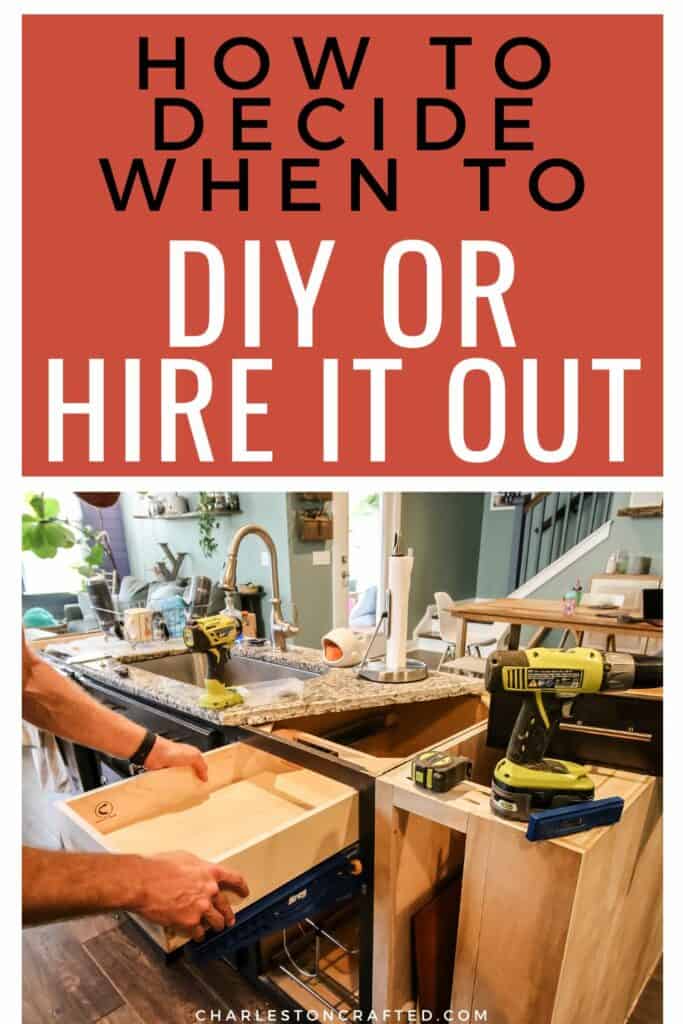
How to decide when to DIY and when to hire it out
When you decide whether to hire something out or DIY it, you need to ask yourself a few realistic questions about your skills and availability.
Of course, you can always learn new skills (within reason) but if you are busy, it will never happen.
On the flip side - assess cost. If it's over budget - hiring will never happen!
Overall, you need to decide - do you want to spend time or money on this project. DIY takes forever and ever sometimes. But, hiring is expensive. I feel like we can't even get someone to come look at our house for under $1,000 any more!
Pros of Hiring it Out
- Low effort on your part
- You can walk away and it's done - like magic
- Hopefully a high quality of work
Pros of DIY
- Typically lower cost
- Empowering to learn a new skill
- Do something super custom exactly what you want (assuming you can figure it out!)
- You are your top priority/only customer
Cons of Hiring it Out
- Higher cost
- May not be their top priority
- Sometimes frustrating experience
Cons of DIY
- Limited by skills or tools
- Can take forever
- Might not get perfect results
- Can get expensive if you aren't careful
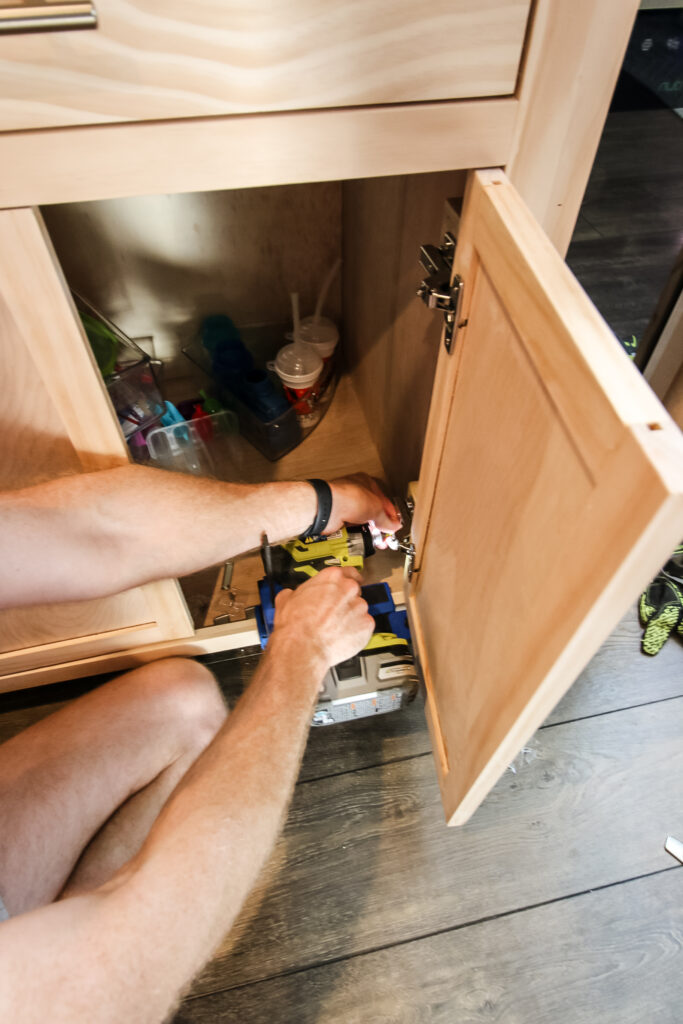
Factors to consider when hiring out a project of DIYing it
Consider each of these factors when deciding to hire or not!
Safety
First of all - is this project safe to do? Is there a big risk of hurting yourself?
Our house is 3 stories tall, and raised, so our roof is 4 floors up. Working on our own roof is a big old NO for safety reasons.
Second of all - is there a safety risk if you mess it up?
We often consider this around plumbing or electrical. We can re-wire a light fixture, but moving the box? Many people say it's simple - but there's a risk that we could burn the place down, so this is a task we normally hire out.
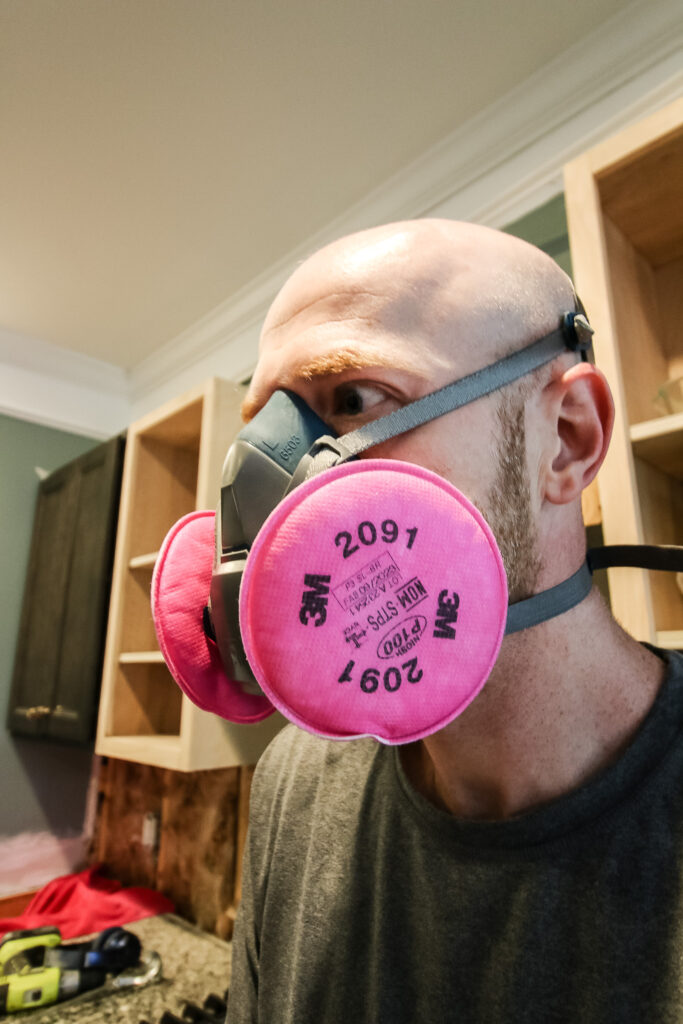
Skills
Do you have the skills AND tools to complete the task? We are all about learning new DIY skills - obviously! But, you have to be realistic about what you can learn.
I taught myself how to tile a backsplash by watching a few videos and just going for it. No problem!
Could I watch videos about how to take down a load bearing wall? I mean, sure, I assume they are on YouTube. But, that's going to fall above my skill level.
Ditto for tools - if you don't own them, or have anyone to borrow them from, it might get a bit tricky to complete the task!
Also, consider if you have support. This is like literally a friend or neighbor who can come give you a hand. Maybe not with the whole project - but with a few bursts of heavy lifting as needed. A second set of hands can make a big difference in getting a big job done!
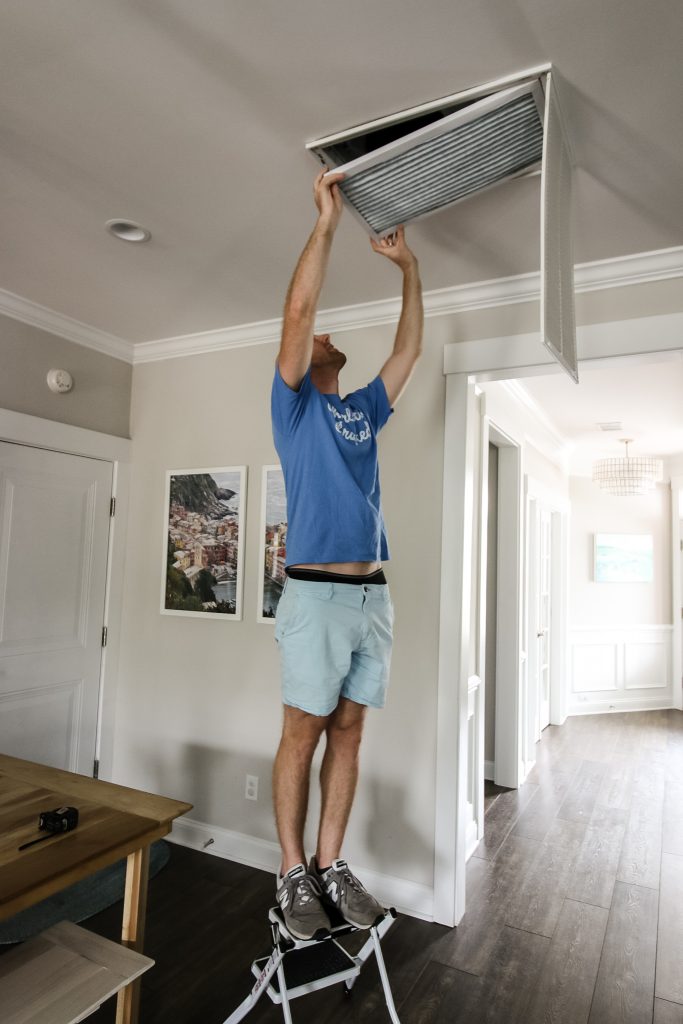
Cost
Now, assess the cost. Get a quote or estimate (or just google estimated costs!) for a professional. Then, factor in your time, supplies, and tools you'd need. What's the cost difference? Sometimes, if you need to buy expensive tools you won't use again, it's easier to hire it out.
Also, consider your budget. If it's not in the budget, it doesn't matter the cost. Your choice is DIY it or don't do it!
Low to no budget is how we got started DIYing in the first place. It can feel frustrating, but it is also an empowering place to learn new skills from!
Time
Finally, be realistic about how much time you have. Maybe you have the skills and budget to build your own cabinets - but not the hours and hours of time needed.
Whether you are on a time crunch or just a busy person, sometimes it's worth it to just go to work, come home, and the project was magically done by fairies in your absence.
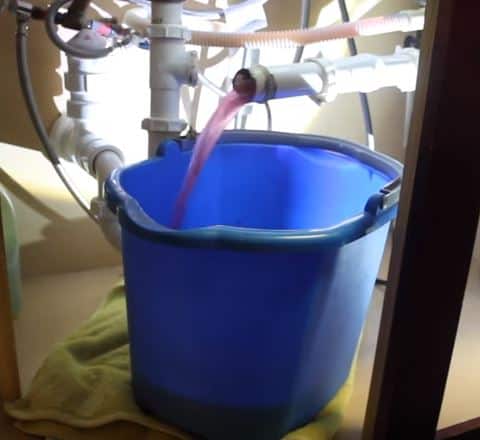
How to choose to hire or DIY
Here are some questions to consider when deciding to hire out or DIY a project.
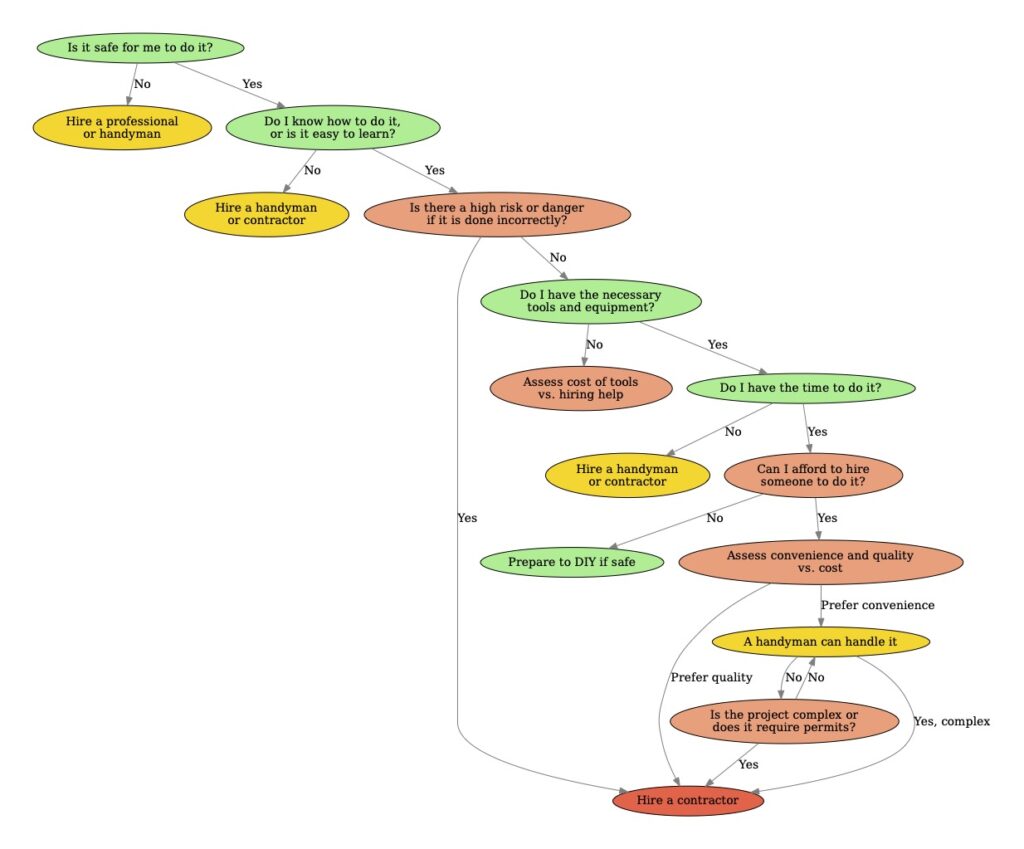
- Is it safe for me to do it?
- No ➜ Proceed to hire a professional or handyman.
- Yes ➜ Go to question 2.
- Do I know how to do it, or is it easy to learn?
- No ➜ Consider hiring a handyman or contractor.
- Yes ➜ Go to question 3.
- Is there a high risk or danger if it is done incorrectly?
- Yes ➜ It's better to hire a contractor.
- No ➜ Go to question 4.
- Do I have the necessary tools and equipment?
- No ➜ Assess the cost of purchasing or renting tools vs. hiring help.
- Yes ➜ Go to question 5.
- Do I have the time to do it?
- No ➜ Consider hiring a handyman or contractor based on the complexity of the job.
- Yes ➜ Go to question 6.
- Can I afford to hire someone to do it?
- No ➜ Prepare to take on the project yourself if it's safe and feasible.
- Yes ➜ Assess whether the convenience and guaranteed quality of hiring a professional are worth the cost.
- Is the project complex or does it require permits?
- Yes ➜ Hire a contractor.
- No ➜ A handyman can likely handle it if you prefer not to DIY
Remember - you don't have to hire out a whole project - it's not all or nothing! A great budget-hack is to DIY most of the project and just hire out the most skilled or undesirable aspects!
For example, we are DIYing our kitchen, but hired a plumber and electrician. Could we have done those tasks? Probably, yes. But it would have taken a ton of time, new tools, learning new skills, and risk some big problems if we messed it up!
Hiring a Handyman vs Contractor
If you do decide to hire something out - you still have to determine who to hire. For a specific task - plumbing, tile work, etc - it's easy to know that you should hire a specialist. But, what about more general tasks?
You might want to consider if you need a full blown contractor or if a handyman will do.
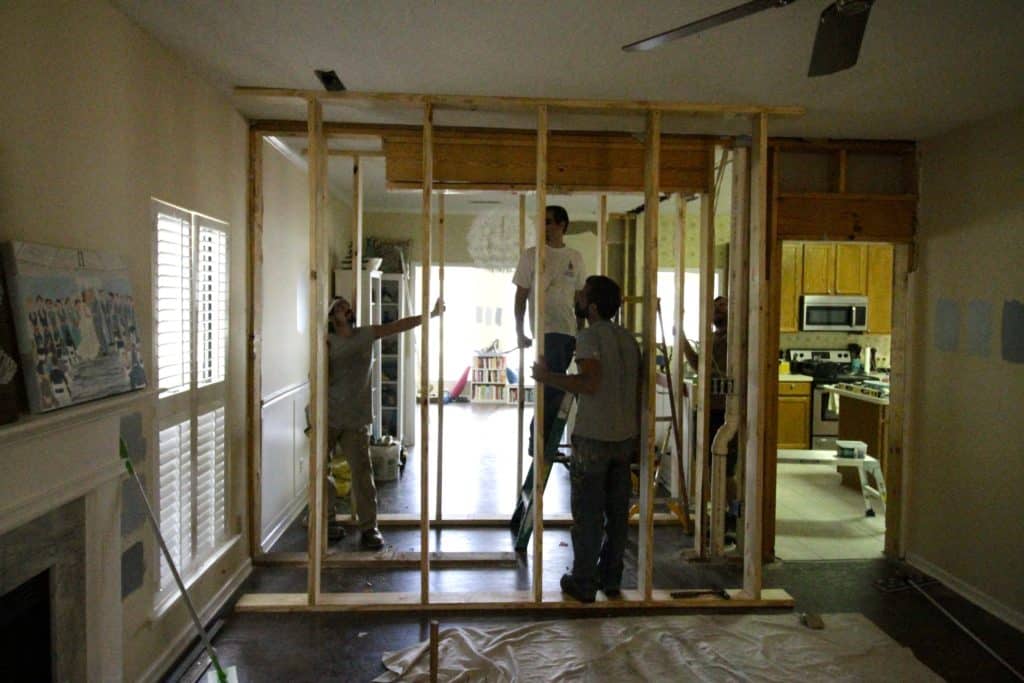
Contractor
In general, a contractor is usually who you hire if you want someone to take control of a large job. This would include doing some work themselves and also hiring out sub-contractors (like electricians and plumbers) to take on the more specialized work.
Contractors should be licensed and are ideal for large project management and times when you need extras like permits pulled.
When to hire a contractor:
- Large-Scale Renovations: For projects like remodeling a kitchen or adding an extension to your home, where structural changes are involved.
- Electrical Rewiring: For comprehensive rewiring of your home to ensure safety and compliance with local electrical codes.
- Major Plumbing Work: Such as installing a new sewer line or fixing foundational plumbing issues.
- Roof Replacement: Contractors have the expertise and tools to handle complex, labor-intensive tasks like replacing an entire roof.
- Permit Requiring Projects: Any project that requires permits typically needs the expertise of a licensed contractor who is familiar with local building codes and regulations.
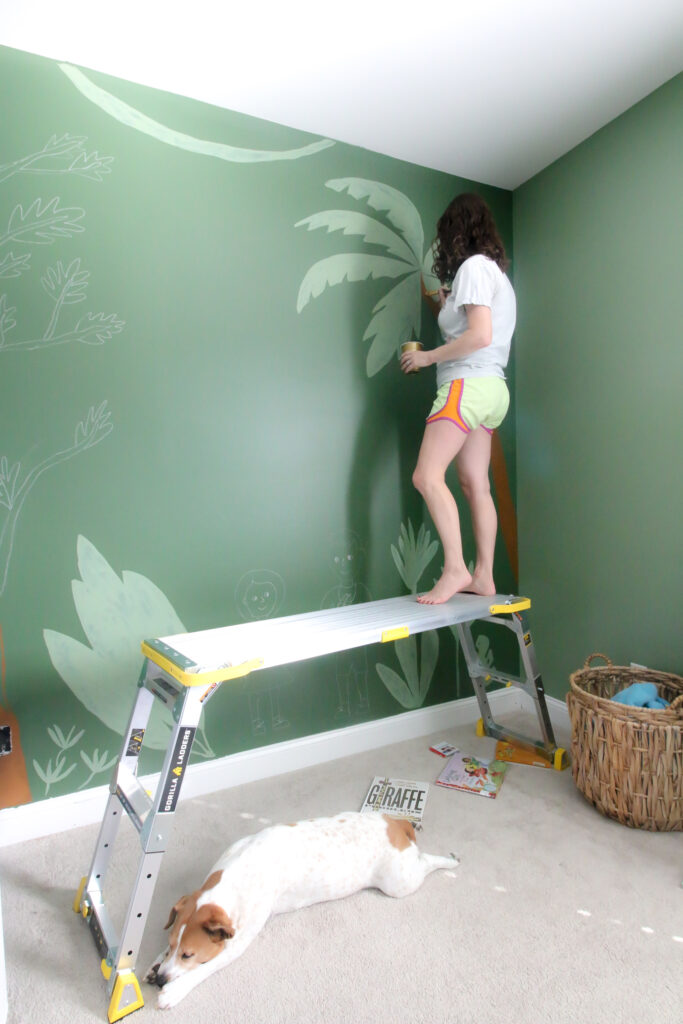
Handyman
If you just need a specific one-off task completed, a handyman (or handy-lady) might be all you need. They typically handle smaller jobs, for a way lower cost, and a quicker turn around.
Handymen are great for taking over minor tasks that you don't want to do yourself. Whether it's a lack of tools, time, or skills - they can help you out - for a cost!
When to hire a handyman:
- Minor Home Repairs: Fixing leaky faucets, repairing broken tiles, or patching up small holes in walls.
- Assembling Furniture: For tasks like assembling furniture or installing shelving units.
- Painting and Decorating: Handy for smaller painting jobs or decorating tasks like hanging wallpaper.
- Routine Maintenance: Tasks such as gutter cleaning, HVAC filter replacements, and general upkeep around the house.
- Basic Installation: Such as setting up light fixtures, hanging pictures, or installing simple appliances.
Free printable project planner
Need help getting organized? Our free printable DIY project planner will help you get it all organized and planned on one page!
Looking for something?
We've been doing this since 2012 so we have a LOT of blog posts!
Search stuff like: Ceiling Projects | DIY Plant Stands | Thrift Flips


Hello, I'm Morgan, half of the creative force behind CharlestonCrafted.com! With a passion for DIY that dates back to 2012, I've transformed three homes and now I'm dedicated to helping others craft their dream spaces. Let's turn your house into a home together!





